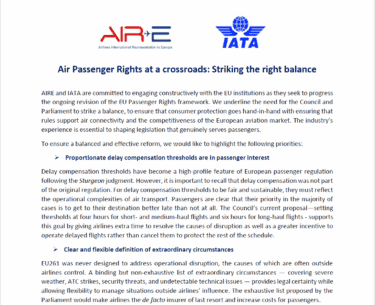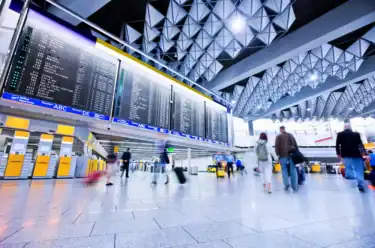As part of the EU’s Fit for 55 Package, the revised EU Emissions Trading System (EU ETS) Directive 2023/959 introduces substantial measures to reduce emissions across the aviation sector. The directive mandates a complete phase-out of free emissions allowances for aviation by 2026, requiring operators to fully cover the cost of their carbon emissions. Additionally, from 1 January 2024 to 31 December 2030, 20 million allowances will be allocated to help offset the cost difference between conventional fossil kerosene and sustainable aviation fuels (SAF). Starting in January 2025, aircraft operators will also be required to monitor and report their non-CO₂ emissions, including NOₓ, water vapor, and contrails, which could be challenging for aircraft operators due to ambiguities in the monitoring methods.
AIRE is committed to promoting sustainability in aviation, ensuring that efforts towards green aviation are both economically viable and competitively balanced. As a member of the expert group on climate change policy for aviation with DG CLIMA, AIRE is actively engaging in upcoming discussions to address emerging issues, such as:
- Advocating for Sustainable Aviation Fuels (SAF) financial support to offset the price difference with conventional kerosene. AIRE’s efforts extend beyond securing funding. They also involve providing expert feedback to DG CLIMA to design a fair and effective support mechanism for Fuels Eligible for ETS (FEETS), ensuring the equitable distribution of the 20 million EU ETS allowances. Additionally, AIRE is committed to promoting policies that enable the scaling up of SAF production and availability across the sector, making SAF accessible to airlines both within and outside the EU. This support is crucial to helping the global aviation industry achieve its goal of net-zero carbon emissions by 2050.
- Civil aviation is vital for the economy and tourism, but restrictive regulations could jeopardize the sector and EU economic stability. AIRE is committed to actively participating in public dialogue to create effective measures that boost the competitiveness of the EU aviation sector. Thus, we have strongly advocated for the inclusion of competitiveness within the agenda for 2025 of the Sectoral Social Dialogue Committee.AIRE will continue to monitor the implementation phase of the non-CO₂ MRV to prevent any potential legal proposal addressing non-CO₂ effects mitigation, should it ultimately be considered by the Commission, and will advocate for an evidence-based scientific assessment beforehand.
- Monitoring Commission’s evaluation of CORSIA’s sufficiency. The Carbon Offsetting and Reduction Scheme for International Aviation (CORSIA), is a global framework established by the International Civil Aviation Organization (ICAO). It aims to limit and reduce carbon emissions from international aviation by requiring airlines to offset emissions that exceed 2019 levels (1). This is done by purchasing carbon credits from environmental projects. By 2026, the European Commission will assess whether CORSIA sufficiently addresses aviation emissions. If CORSIA is deemed inadequate, the EU Emissions Trading System (ETS) could be expanded to include flights from and to the European Economic Area (EEA), which may impact the international aviation framework and cause competitive imbalances.
By actively engaging with the EU Institutions, AIRE advocates for fair climate policies aimed at reducing emissions while preserving airline competitiveness and minimizing market distortions. It is essential that airlines have sufficient resources to implement the sustainable strategies necessary for achieving emissions reductions. Financial incentives are required to support not only the availability of SAF but also to make fuel-efficient technologies and next-generation aircraft affordable, thereby improving overall efficiency.


